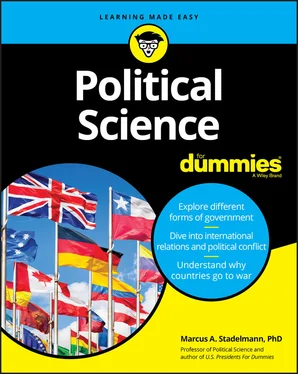1 ...7 8 9 11 12 13 ...20
Agreeing with behavioralism
Post-behavioralism did not initiate a complete break from behavioralism. Instead, it kept quite a few of behavioralism’s core ideas. These include:
Explaining and studying human behavior: Post-bevioralists believe that political scientists should study human behavior and not just institutions and constitutions as traditionalists did. In addition, the emphasis on examination instead of description needed to be kept, because you could solve only current problems and help people by trying to analyze, explain, and find solutions.
Using empirical theory: The use of empirical theory needed to be maintained. Obviously, it wasn’t good enough to just assume and bring your own biases into your research if you wanted to solve current problems. The researcher had to use mathematics, especially statistics, to conduct testable research. Only empirical theory could guarantee explanations to deal with modern-day problems.
Having a global perspective: Political scientists needed to maintain their emphasis on the newly developing countries in Asia and Africa. Eurocentrism had to be rejected because, by the late 1960s, most nations weren’t in Europe or the Americas but were located in Africa and Asia. Therefore, the study of nation-states had to be moved into the developing world.
Differing from behavioralism
While accepting many of behavioralism’s ideas and concepts, post-behavioralism had some big differences. First, there was major disagreement over whether political science and the rest of the social sciences should try to become a real science like the natural sciences. The question was why political science should be like chemistry if it meant giving up doing real-world research that could actually help people. Also, many political scientists flat out rejected the idea that a social scientist could actually conduct objective or value-neutral research. Most post-behavioralists rejected the notion of positivism (see the section “ Being truly objective,” earlier in this chapter), instead adhering to a school of thought referred to as historicism.
 Historicism is also called the German school of thought. Major German philosophers, such as Georg Friedrich Hegel and Karl Mannheim, supported it in the 19th and 20th century. The idea is that all human thought is socially determined and relative to time. In other words, everybody, including the political scientist, receives values from the environment she grew up in, and these values will determine how (1) research is conducted, and (2) what conclusions can be drawn from that research. A political scientist growing up in the U.S. won’t interpret the results of research in a similar fashion to someone who grew up in Russia.
Historicism is also called the German school of thought. Major German philosophers, such as Georg Friedrich Hegel and Karl Mannheim, supported it in the 19th and 20th century. The idea is that all human thought is socially determined and relative to time. In other words, everybody, including the political scientist, receives values from the environment she grew up in, and these values will determine how (1) research is conducted, and (2) what conclusions can be drawn from that research. A political scientist growing up in the U.S. won’t interpret the results of research in a similar fashion to someone who grew up in Russia.
Post-behavioralists also believe that all thought is bound by the time period you grow up in. Someone growing up in the 1850s perceives research differently from someone conducting research in the 21st century. Therefore, true objective knowledge is impossible. People are subjective, formed by the environment they grew up in, even if they claim to be objective in nature.
Post-behavioralists also argue that objectivity doesn’t exist and that not just all social scientists are subjective but everybody is. Society needs to accept this.
Post-behavioralists don’t believe that grand theory can be discovered in the social sciences, including political science, and don’t support even attempting to create it. For them, grand theory is so abstract that it can’t be used to explain current problems and therefore there’s no use for it. They argue that the political scientist should forget about turning political science into a real science and should also forget calling for pure objectivity in research because it doesn’t exist.
Finally, post-behavioralists advised for more third-world studies and fewer studies of the advanced world. They were especially concerned with the emphasis behavioralism placed on democracies. Many behavioralist theories worked best in established democracies and weren’t adaptable to other forms of government.
Post-behavioralists became fully third-world oriented and will often travel to third-world countries to immerse themselves in local cultures to better understand the local cultures and their politics.
 By the 1980s, many more political scientists studied third-world countries than advanced industrialized countries, and there was even a shortage of European and Soviet scholars in the U.S.
By the 1980s, many more political scientists studied third-world countries than advanced industrialized countries, and there was even a shortage of European and Soviet scholars in the U.S.
Comparing Political Science Theories
In this book, the term theory is used on many occasions. What is a theory? Are theories important to the field of political science? The answer is a clear yes. Without theories, the discipline of political science is quite useless. Theories are an integral part of the study of political science, especially some of its subfields such as international relations and comparative politics.
A theory is defined as a general explanation of behavior or events. It can be applied across many cases and is not specific to one. A theory therefore tries to explain why a certain event has occurred or why people behave in a certain way. For example, we have theories of why World War II occurred or why Adolf Hitler acted the way he did. Chapter 12outlines theories explaining why war and other international conflict occur.
Theories are designed to not only explain but also predict behavior and events. If a political scientist can predict what causes a certain event, such as warfare, it may be preventable. For example, one of the theories in Chapter 12claims that democracies are less likely to go to war than other forms of governments. If this is true, then democracy needs to be spread throughout the world, and slowly war will disappear. This has been the cornerstone of American foreign policy since the end of World War II.
Read on to find out more on the three types of political science theories: grand, medium range, and narrow range.
The first step on the way to create a theory is to come up with a hypothesis. All a hypothesis is, is a testable proposition. An example: Women are more liberal than men. This is a basic proposition or proposal. Next, researchers set out to test the proposition. They collect information or data empirically — that is, based on observable evidence. In this case, they could create a public opinion survey and administer several polls in different countries. They then quantify the results, measure them with numbers, and test them. If the hypothesis proves true, they’ve created a theory. The aforementioned hypothesis, women are more liberal than men, is actually wrong. It holds true in the U.S. but is wrong in other countries, where men are more liberal.
Grand theories are the most prestigious and sought after. They claim to provide explanations or predictions over time and space. In other words, they claim to be universal in nature. The concept of grand theory comes from the natural sciences such as physics and chemistry. A good example is the mixing of two chemicals. After you mix the two, a certain result occurs. The result will be the same whether you mix the chemicals in Africa or Europe (space) or whether you mix the two today or in two years (time).
It’s tougher to create such theories in the social sciences such as political science or sociology. However, a few grand theories have been created in political science, and one of the most famous ones, the theory of the civic culture, states that only one specific culture can sustain democracy in the long run, and unless you create it, democracy will collapse in a country. As soon as the culture is created, democracy is here to stay in a country. It doesn’t matter where you create it (space) or when you create it (time). Therefore, it’s universal in nature and can be used to predict whether democracy can succeed in a country. See Chapter 3for more details.
Читать дальше

 Historicism is also called the German school of thought. Major German philosophers, such as Georg Friedrich Hegel and Karl Mannheim, supported it in the 19th and 20th century. The idea is that all human thought is socially determined and relative to time. In other words, everybody, including the political scientist, receives values from the environment she grew up in, and these values will determine how (1) research is conducted, and (2) what conclusions can be drawn from that research. A political scientist growing up in the U.S. won’t interpret the results of research in a similar fashion to someone who grew up in Russia.
Historicism is also called the German school of thought. Major German philosophers, such as Georg Friedrich Hegel and Karl Mannheim, supported it in the 19th and 20th century. The idea is that all human thought is socially determined and relative to time. In other words, everybody, including the political scientist, receives values from the environment she grew up in, and these values will determine how (1) research is conducted, and (2) what conclusions can be drawn from that research. A political scientist growing up in the U.S. won’t interpret the results of research in a similar fashion to someone who grew up in Russia. By the 1980s, many more political scientists studied third-world countries than advanced industrialized countries, and there was even a shortage of European and Soviet scholars in the U.S.
By the 1980s, many more political scientists studied third-world countries than advanced industrialized countries, and there was even a shortage of European and Soviet scholars in the U.S.










